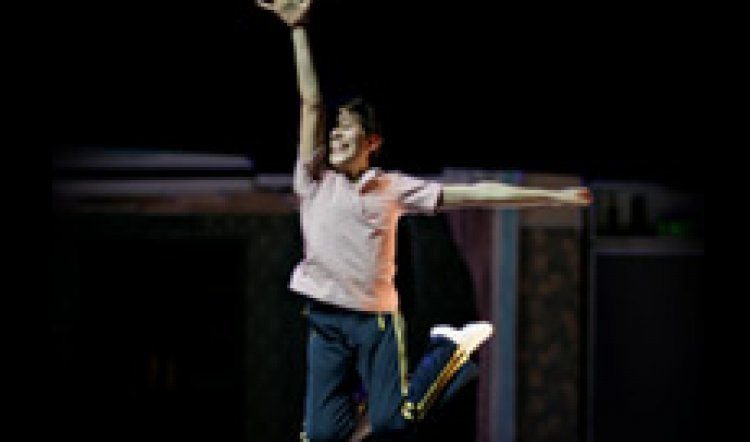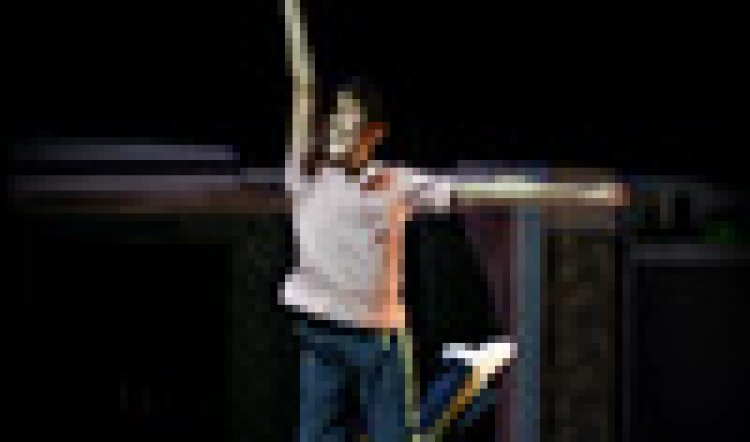
Billy Elliot
Billy Elliot, Capitol Theatre, Haymarket, to July 1, 2008; ph: 136 10 or www.ticketmaster.com.au
There are two stories in Lee Hall's and Elton John's musical, Billy Elliot. One is of the working class boy dreamer who dares to imagine a life beyond his Northumbrian pit village; the other is of the virtual civil war that engulfed Britain during the early Thatcher years. Both strands are strong stuff and remarkably so when set to music.
The UK miners' strike of 1984-85 is the dramatically stirring and - eventually - heart-rending bedrock of the show. It arose out of Britain's traditional class structure, the divide between the north and south (poor, working class north, rich middle class south) and out of the Thatcher government's determination to break the mining unions in particular and the trade union movement in general.
This is not to say that the union movement didn't need urgent and thorough reform: in Billy the hidebound, hoary face of the dinosaur Stalinist old guard is honestly portrayed. But so is the greater tradition of family, loyalty, solidarity, benevolence, care and courage. It was this deep vein of human decency and pride in the working class north that the social-climbing Thatcher instinctively loathed and mercilessly attacked.
Not exactly the stuff of musical theatre, you're thinking? Well yes and no and why not? Grand and terrible stories are well suited to a musical setting - ask Verdi and Puccini. Not forgetting Miss Saigon either. And there is nothing in Musicals 101 to suggest that storylines must be anodyne, fantasy or downright silly.
Lee Hall's book and lyrics are exhilaratingly raw, honest, well-crafted and apposite; his characters ring true, emotionally and politically. For his part, Elton John has delved deep into the musical roots of the north of England, vaudeville and 1980s political theatre for inspiration and the result is one of the most theatrically satisfying scores of the past forty years. Between them Hall and John have created a modern musical masterpiece that provokes audiences to tears and laughter by turn and turn about. Billy is a very special piece of work.
The musical is based on the award-winning 2000 movie, written by Hall and directed by Stephen Daldry - who steers the stage version with an equally sure hand. Ian Macneil's set design - the Elliots' semi, the village, the pithead, picket lines, the village hall - banishes all memories of the movie in a second. Also ensuring that this Billy is a theatre experience: Peter Darling's choreography is integral to the show's success: tap, clog and jive are added to the mix of classical ballet, which itself begins at endearingly clodhopping village hall dance school level and gradually rises to a - literally - flying, soaring crescendo of alchemical transformation.
[page]The children in the cast are rotated through sets of four (Billy and his key mates are almost constantly on stage throughout.) On the gala opening night in Sydney, Rhys Kosakowski was the boy whose turn had come to play Billy and he was sheer magic: an intelligent performer who already knows about nuance and the journey a character undertakes. The role calls for a boy who can sing, act and be a more than creditable ballet dancer - a huge ask and Kosakowski answered all questions and then some. According to reports, the other three Billys are all delightful in their different ways and each brings something unique to the show. It's an interesting challenge for the adults - and one which should keep them fresh and on their toes through 2008.
 The adults, it must be said, more than hold their own under the onslaught of talented youth. In particular, the heartbreaker of the evening is Genevieve Lemon as Billy's hard-bitten dance teacher, Mrs Wilkinson. Lemon is one of Australia's best-known musical theatre performers as well as a high calibre actor and she brings everything she's ever known or done to the central role of the heart-of-gold and arse-of-brass principal of the no-hope village dance school. (Fifty pee for a Saturday morning session.) It's a dodgy call to suggest this is the finest performance she's ever given but it's possible: it's one of those rare conjunctions of character, script and performer where the collision makes something memorable.
The adults, it must be said, more than hold their own under the onslaught of talented youth. In particular, the heartbreaker of the evening is Genevieve Lemon as Billy's hard-bitten dance teacher, Mrs Wilkinson. Lemon is one of Australia's best-known musical theatre performers as well as a high calibre actor and she brings everything she's ever known or done to the central role of the heart-of-gold and arse-of-brass principal of the no-hope village dance school. (Fifty pee for a Saturday morning session.) It's a dodgy call to suggest this is the finest performance she's ever given but it's possible: it's one of those rare conjunctions of character, script and performer where the collision makes something memorable.
Richard Piper (Dad), Lola Nixon (Grandma), Justin Smith (Tony) and George (Linal Haft) form the nucleus of Billy's family and the wider community of the village. All are tremendously solid and each grabs his or her showstopping moments with panache and sure ability. There's not a weak link to be seen in the company.

The weak link, of course, was the reality behind the Billy story: that the leadership of the NUM (National Union of Miners - whose placards and grand marching banners play such a part in the action and the setting) had fatally under-estimated the resolve and strategy of the Thatcher government. The NUM leadership called out the men without realising the Coal Board - with the assistance of the government - had been stockpiling coal for months. Instead of power stations running out of fuel, it was the miners who were eventually starved into submission. They were dark days in every sense.
Whatever the economic and political rights and wrongs of the matter, the human cost was immense and is portrayed with candour in Billy Elliot. Father against, son, brother against brother; families and communities were split, the British people were split, one from the other (police were always shipped in from elsewhere so fellow feelings were minimal and brutality was assured). It was the best and worst of times; in the end, worst won.
And the eventual response of the Thatcher government to the destruction of jobs, families and livelihoods in the north was employment minister Norman Tebbit's infamous remark: "I grew up in the 1930s with an unemployed father ... He got on his bike and looked for work, and he went on looking until he found it." What he chose to overlook, however, was that the destitution and desperation of the 1930s was the result of the Wall Street crash of 1929 - not deliberate government policy against working families.
[page]In the midst of this social upheaval is a boy - Billy - who really hates his Saturday morning boxing lessons and stumbles, quite literally, into Mrs Wilkinson's ballet class. The only boy in the tribe of galumphing, giggling girls and the immediate butt of poofter jokes from every member of the community, Billy's fortitude is as inspirational as this kind of determination always is in these circumstances. It's universal too: how many actors, musicians and artists - famous or otherwise - know only too well how hard it is to be different. And they're not even poofters, which always puts the icing on the fairy cake.
 As well as telling stirring stories, Billy is also laced through and through with glorious humour: while the tears are still making your mascara sticky you'll be laughing again. And you'll also be recognising other universal truths: some commentators have been a bit sniffy about the language - suggesting the show may not be suitable for 10-year-olds because of the expletive content. The language is fruity - and realistic - and the fact that a lot of the choicest bad words issue from the mouths of babes is just as realistic and also honest.
As well as telling stirring stories, Billy is also laced through and through with glorious humour: while the tears are still making your mascara sticky you'll be laughing again. And you'll also be recognising other universal truths: some commentators have been a bit sniffy about the language - suggesting the show may not be suitable for 10-year-olds because of the expletive content. The language is fruity - and realistic - and the fact that a lot of the choicest bad words issue from the mouths of babes is just as realistic and also honest.
If any element of Billy is offensive it isn't that the effs and blinds and shits issue forth from young mouths with such unselfconscious glee, it is that a society could be so heedless of children and their families as to impose upon them the kind of brutality that ultimately makes their (bad) language irrelevant.
Speaking of language: William Conacher is credited in the program as "supervising dialect coach" and must be given all praise. The Geordie accent isn't easy - even for Geordies - yet the Australian cast, kids and all, have it down almost faultlessly. It's another telling detail in a production where such detail results in a magnificent whole.
Billy Elliot is a triumph for the imported production principals and the home-grown human talent. You'll leave the theatre shaken, stirred and bubbling with that unique deep-seated sense of wellbeing which only great theatre can give.



